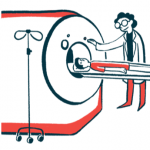MS news notes: Sativex, Octopus ‘mega-trial’, Ocrevus, snuff
Columnist Ed Tobias comments on the week's top MS news

Welcome to “MS News Notes,” a Monday morning column where I comment on multiple sclerosis (MS) news stories that caught my eye last week. Here’s a look at what’s been happening:
Good patient reviews for Sativex
Sativex (nabiximols) is an oral cannabinoid spray designed to ease MS spasticity. It is available in Canada and most of Europe, but has not been approved for use in the U.S.
The MS News Today story “Sativex eases MS spasticity and related symptoms in real-life study” reports on a three-month study in Austria, where 87.5% of Sativex users in the study said they were at least partly satisfied with the therapy. That partial satisfaction is what someone else, who participated in a Sativex study in Belgium, told me two years ago.
Unique ‘mega trial’ recruiting in UK
Octopus, described as the world’s first “mega-trial,” has multiple tentacles. It will test several experimental MS therapies against a shared control group at the same time. Treatments that appear effective in early data can continue into the next stage without needing to set up a new trial and new infrastructures.
Octopus is expected to enroll at least 1,200 participants over the next six years. Anyone living in the U.K. with primary progressive MS or secondary progressive MS can register their interest at the UK MS Register.
Read more in the story “Octopus ‘mega trial’ opens to progressive MS patients in the UK.”
Prior treatments and Ocrevus
Medications used to treat MS prior to treatment with Ocrevus (ocrelizumab) could have an impact on the success of the latter therapy, the story “Findings may help optimize therapy for patients considering Ocrevus” reports.
Researchers compared patients who either previously had been treated with Tysabri (natalizumab) or Gilenya (fingolimod), or who had no prior treatment before being treated with Ocrevus. The results are interesting, although researchers noted that “further longitudinal studies in larger cohorts of people with MS may help optimize the therapeutic switch.”
Moving to snuff to quit smoking?
Several studies over the years have suggested that smoking and exposure to secondhand smoke are associated with faster MS disease progression.
The story “Quitting smoking or moving to snuff may help slow MS progression” reports that “stopping smoking after diagnosis or replacing smoking with moist snuff may help modify the course of MS and reduce its progression in patients.”
This concerns me. The U.S. Centers for Disease Control and Prevention warns that smokeless tobacco is associated with many health problems, including diseases of the mouth, cancer, and pregnancy problems, and an increased risk of heart disease and stroke.
While researchers in the study mentioned above may be searching for an alternative to smoking to help reduce patients’ MS progression, I’m troubled that someone reading this might think that snuff is safe. I think trading cigarettes for snuff just swaps health hazards, although that’s just my opinion.
Note: Multiple Sclerosis News Today is strictly a news and information website about the disease. It does not provide medical advice, diagnosis, or treatment. This content is not intended to be a substitute for professional medical advice, diagnosis, or treatment. Always seek the advice of your physician or other qualified health provider with any questions you may have regarding a medical condition. Never disregard professional medical advice or delay in seeking it because of something you have read on this website. The opinions expressed in this column are not those of Multiple Sclerosis News Today or its parent company, Bionews, and are intended to spark discussion about issues pertaining to multiple sclerosis.








SammyJo Wilkinson
Thanks Ed! I checked on Sativex U.S. approval and found a report from June 2022 that a phase 3 FDA trial did not meet endpoints; RELEASE MSS1 68 participants with MS spasticity. But 2 other two trials, RELEASE MSS3 and RELEASE MSS5, involve 446 and 190 participants, are ongoing.
Sativex’ has been approved in 29 countries and revenues were $13 million in 2021, pretty small compared the Jazz's other cannabis medicine Epilodex at $449 million. I have wondered what the market will be in the U.S. for Sativex, especially since there is relatively easy access to THC/CBD cannabis products in legalized states, and online ordering is legal for CBD products. The cost is around $50-100/mo. Do you have any idea what the insurance co-pay for Sativex might be if it does get approved in U.S.?
Sources:
https://www.biospace.com/article/cannabis-derived-ms-drug-misses-key-endpoint-in-u-s-phase-iii-trial/
https://www.fiercepharma.com/pharma/trial-failure-jazzs-cannabis-derived-drug-blunts-goal-expand-its-use-us
Ed Tobias
Hi SammyJo,
Thanks for sharing that info. I think the potential Sativex market in the U.S. depends on its price, and how much of the cost will be picked up by Medicare/Medicaid and private insurance. I haven't the slightest idea what that might be. As you indicate, that will need to be compared to the cost and effectiveness of THC/CBD products.
Ed